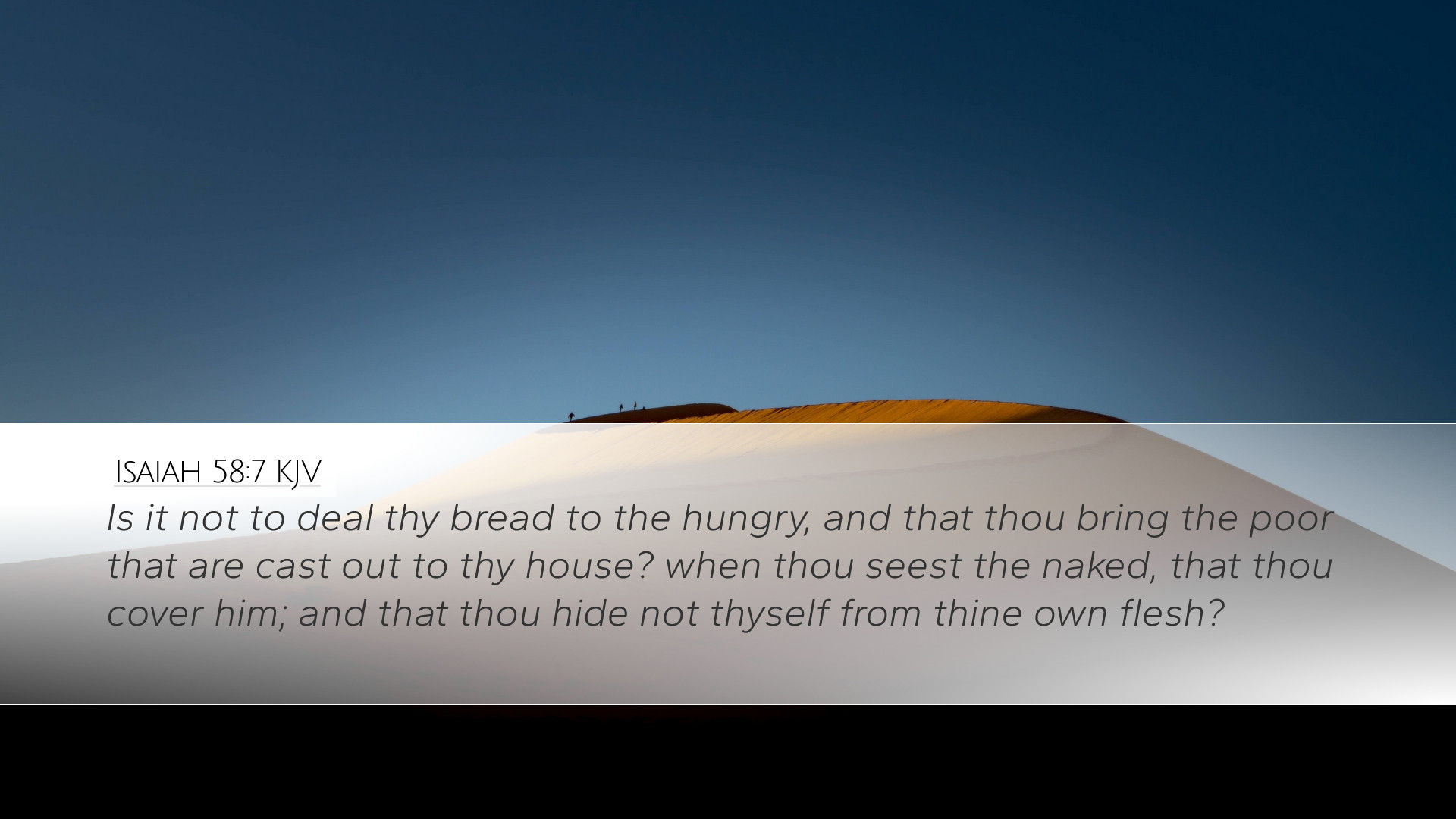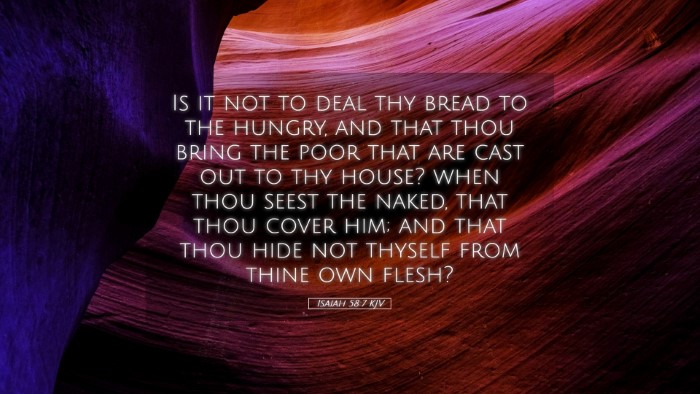Isaiah 58:7 - A Commentary
Verse Text: "Is it not to share your bread with the hungry, and to bring the poor who are cast out to your house? When you see the naked, that you cover him, and not hide yourself from your own flesh?"
Introduction
The book of Isaiah is filled with profound insights regarding the character of God and His expectations from His people, particularly concerning justice and compassion. In Isaiah 58:7, the Prophet Isaiah addresses the true nature of fasting, highlighting the moral imperatives that come with it. This commentary seeks to synthesize insights from notable public domain commentators such as Matthew Henry, Albert Barnes, and Adam Clarke to explore the depths of this verse.
Context of Isaiah 58
Prior to delving into verse 7, it is crucial to understand the broader context of Isaiah 58. The chapter famously critiques empty rituals and superficial worship that lacks the corresponding ethical life. The Israelites were engaged in fasting and other religious practices but failed to demonstrate the love and care that God desires for His people. Isaiah serves as a mouthpiece for God, proclaiming that true worship is manifested in acts of social justice and mercy.
Analysis of Key Phrases
1. "Share your bread with the hungry"
Albert Barnes emphasizes the importance of practical charity in this phrase. Sharing one’s bread goes beyond merely giving food; it encompasses a relational aspect of community and kinship. This act symbolizes a willingness to enter into a covenantal relationship where the needs of others are prioritized.
2. "Bring the poor who are cast out to your house"
Matthew Henry notes that this highlights a radical hospitality that invites the marginalized into one's life. It is a call to action that requires risk and vulnerability. By welcoming the poor, one not only meets their physical needs but also restores dignity and hope, reflecting the heart of Christ.
3. "When you see the naked, that you cover him"
Adam Clarke points out that clothing the naked serves as a symbol of providing not just physical covering but also social and spiritual protection. It speaks to a deeper issue of human dignity, where the act of covering is representative of affirming the worth of individuals often stripped of their dignity by society.
4. "Not hide yourself from your own flesh"
This phrase serves as a moral imperative not to disengage from one’s family and community. Barnes interprets this as a reminder of the familial bond that should compel us to act in love and assistance, reinforcing the idea that one cannot be indifferent or passive in the face of another's suffering.
Theological Implications
1. God's Care for the Underserved
The teaching in Isaiah 58:7 reflects God’s deep concern for justice and mercy. Matthew Henry asserts that engaging in acts of compassion aligns believers with God's character. Therefore, true piety must express itself through caring for the most vulnerable in society.
2. Fasting Beyond Ritual
Albert Barnes underscores that the essence of fasting is not merely abstaining from food but involves engaging in actions that reflect God’s love. The emphasis is on sacrificial acts that embody the principles of the Kingdom of God, emphasizing a holistic approach to spirituality that informs all aspects of life.
3. The Nature of True Worship
Isaiah’s message is clear: worship is intertwined with genuine concern for others' needs. Adam Clarke suggests that worship that does not translate into action is hollow. Believers are called to serve as the hands and feet of Christ, and this verse serves as a potent reminder that our faith must manifest in tangible ways.
Practical Applications
- Community Engagement: Churches and individuals are encouraged to actively seek opportunities to support the needy in their neighborhoods.
- Radical Hospitality: Create welcoming environments for the marginalized, breaking down barriers that keep people apart.
- Educational Initiatives: Offer training programs focused on social justice and mercy to empower congregation members to serve effectively.
- Advocacy: Engage in advocacy for systemic changes that address the root causes of poverty and injustice.
Conclusion
Isaiah 58:7 presents a powerful call for believers to transcend mere ritualistic observance of faith and embrace a lifestyle marked by compassion and justice. Integrating insights from esteemed commentators like Matthew Henry, Albert Barnes, and Adam Clarke deepens our understanding of the verse's implications. The challenge remains for believers to embody the love of Christ in practical ways, ensuring that our faith resonates with the call to share our bread, welcome the outcast, cover the naked, and embrace our kin.


